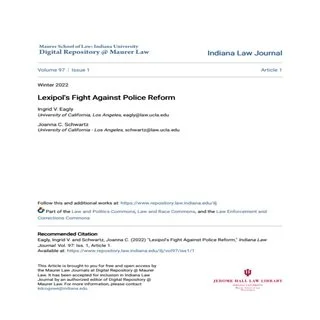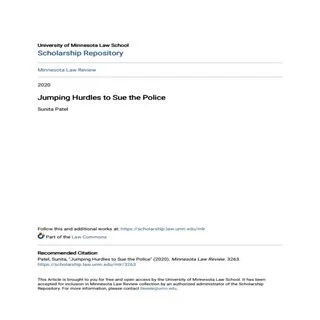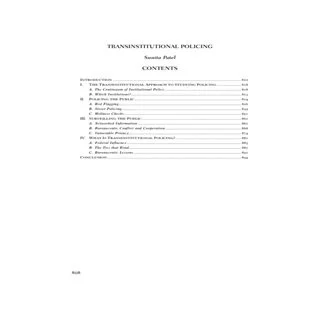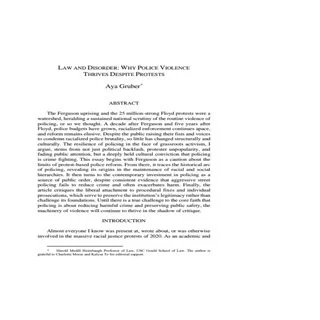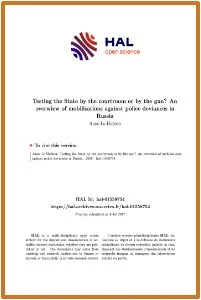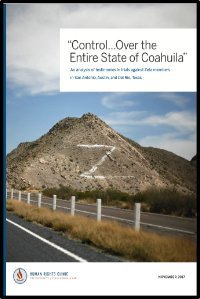By Ingrid V. Eagly and Joanna C. Schwartz
We are in the midst of a critically important moment in police reform. National and local attention is fixed on how to reduce the number of people killed and injured by the police. One approach—which has been recognized for decades to reduce police killings—is to limit police power to use force. This Article is the first to uncover how an often-overlooked private company, Lexipol LLC, has become one of the most powerful voices pushing against reform of use-of-force standards. Founded in 2003, Lexipol now writes police policies and trainings for over one-fifth of American law enforcement agencies. As this Article documents, Lexipol has refused to incorporate common reform proposals into the policies it writes for its subscribers, including a use-of-force matrix, policies requiring de-escalation, or bright-line rules prohibiting chokeholds and shooting into cars. Lexipol has also taken an active advocacy role in opposition to proposed reforms of police use-of-force standards, pushing, instead, for departments to hew closely to Graham v. Connor’s “objectively reasonable” standard. Finally, when use-of-force reforms have been enacted, Lexipol has attempted to minimize their impact. Local governments, police departments, and insurers have long viewed Lexipol as a critically important partner in keeping policies lawful and up to date. This Article makes clear that they should take a closer look. Lexipol’s aggressive efforts to retain wide officer discretion to use force may ultimately expose officers and agencies to liability instead of shielding them from it. It is time for advocacy groups seeking policing improvements to train their sights on Lexipol. Unless and until Lexipol changes its approach, the company should be viewed as a barrier to reform.
Indiana Law Journal: Vol. 97: Iss. 1, Article 1. 2022.
By Sunita Patel
During the tenure of President Barack Obama, scholars and advocates viewed the best route for federal court review of police practices to be consent decrees negotiated between municipal police departments and the Special Litigation Section in the Civil Rights Division of the Department of Justice (DOJ) pursuant to 28 U.S.C. § 14141.1 DOJ fact-finding reports and settlements, like the one in Ferguson, Missouri, exposed egregious practices and sought a culture shift by decrees in police departments across the country. The DOJ Process sometimes also bolstered mobilization to achieve police reform already underway outside the court. Today, the current Administration has taken an official position against using 28 U.S.C. § 14141 authority in favor of potentially unconstitutional exercises of police discretion. Although the federal executive branch is no longer a driving force behind police reform litigation, the institution of policing is no less harmful to Black and Brown communities. Thus, the questions motivating this Article are: “What can legal advocates do now? How can communities and their lawyers mobilize within the legal process?” Without the DOJ’s involvement, injured communities interested in court intervention may turn to section 1983 impact litigation, and what legal scholarship terms public law, public interest, or structural reform litigation. Rather than seek monetary damages against particular officers for abusive conduct against individual plaintiffs, structural reform litigation seeks redress from police departments and municipalities for their law enforcement practices and policies. Its goal is to achieve an injunction against, or change in the policies or practices of, a governmental entity. These are cases typically brought as class actions. Legal scholars have pointed to conservative judicial appointments and Supreme Court doctrine as causes for the shrinking of liberal structural reform litigation. Scholars’ views range from “[t]he courthouse door is closed,” to “procedure and doctrine make it really difficult to obtain substantive review of civil rights and constitutional harms”.
104 Minnesota Law Review 2257 (2020),
By Sunita Patel
Policing has become a permanent fixture within other institutions and occurs in more ways and places than are often recognized. For race-class subjugated communities, this means policing has inserted itself into every facet of life, from education and health care to mass transit and housing. Police serve as instruments of control in many spaces and connect the bureaucratic management of safety inside formal institutions of care, learning, and public services. Police connect these safety services to ordinary street policing and wellness checks in the home.This Article provides a framework for analyzing policing within institutional settings. I examine K–12 schools, emergency departments, mass transit, veterans health care, public housing, and universities and colleges. This Article describes six features of transinstitutional policing. The first three — red flagging, street policing, and wellness checks — show how policing the public relies upon police presence within formal institutions. The second three — networked information, bureaucratic conflict and cooperation, and vulnerable privacy — tie surveillance of the public to transinstitutional policing. This framework highlights the susceptibility of institutions to the logics of policing and the ways policing undermines noncarceral and socially valuable institutional goals. This Article frames an emerging literature as a transinstitutional approach of studying policing across and between multiple institutional domains. Examining policing through a transinstitutional lens offers a deeper understanding of the corrosive influence of policing on spaces of learning, care, and public services. The punitive and carceral aspects of these settings become amplified and more visible when the institution of policing takes hold. The features analyzed here have made it easy for police leaders and bureaucratic administrators of these institutions to resist police reform, even though the locations I study are places where advocates and institutional clientele contest policing and broader carceral control. Part I provides a continuum of embedded policing and explains why I focused on these particular institutions. Parts II and III provide the six-feature framework. Part IV offers an analysis of how we got here and draws out lessons learned to further understand transinstitutional policing.
By Aya Gruber
The Ferguson uprising and the 25 million-strong Floyd protests were a watershed, heralding a sustained national scrutiny of the routine violence of policing, or so we thought. A decade after Ferguson and five years after Floyd, police budgets have grown, racialized enforcement continues apace, and reform remains elusive. Despite the public raising their fists and voices to condemn racialized police brutality, so little has changed structurally and culturally. The resilience of policing in the face of grassroots activism, I argue, stems from not just political backlash, protester unpopularity, and fading public attention, but a deeply held cultural conviction that policing is crime fighting. This essay begins with Ferguson as a caution about the limits of protest-based police reform. From there, it traces the historical arc of policing, revealing its origins in the maintenance of racial and social hierarchies. It then turns to the contemporary investment in policing as a source of public order, despite consistent evidence that aggressive street policing fails to reduce crime and often exacerbates harm. Finally, the article critiques the liberal attachment to procedural fixes and individual prosecutions, which serve to preserve the institution’s legitimacy rather than challenge its foundations. Until there is a true challenge to the core faith that policing is about reducing harmful crime and preserving public safety, the machinery of violence will continue to thrive in the shadow of critique.
Washington University Journal of Law & Policy , 78(1), 2025
By Anne Le Huérou
In April 2009, a police officer, D. Yevsyukov opened fire at people in a Moscow supermarket, killing two and wounding several others. In March 2012, a young man died in custody after being raped with a champagne bottle in a police station of the city of Kazan. Soon after, the police reform, passed in March 2011, was considered as a “failure” by the newly appointed Minister of Internal Affairs Vladimir Kolokoltsev. Those two cases of police violence, far from being exceptional, are almost a part of the routine – though not always with such deadly endings - in many police precincts in Russia and comprise a growing amount of the convictions against Russia at the ECHR. These two particular episodes can serve as landmarks for what I would like to develop in this contribution, for the first played a starting point for building-up police violence and deviance issues as a public matter that further helped and pushed the State to undertake a reform, under the presidency of D Medvedev, and the second led to a kind of acknowledgement that the task was too huge, at the very moment when the coming back of V Putin as the President was sending down the issue from the political agenda. In between, very diverse, vivid and sometimes at first glance paradoxical mobilizations against police violence, corruption and misbehavior have spread all over the country. Would they be NGOs helping victims of police violence to seek justice through court, provocative performances from art-groups or people taking arms against the police, these mobilizations
Paris: University of Paris, 2016. 20p.
By Human Rights Clinic at the University of Texas School of Law.
The Human Rights Clinic at the University of Texas School of Law, in cooperation with the Centro Diocesano para los Derechos Humanos Fray Juan de Larios from Coahuila, Mexico, has compiled a report based on analyzed witness testimonies from three U.S. federal trials. Between 2013 and 2016, Zeta members were put on trial in Austin, San Antonio, and Del Rio for crimes of homicide, conspiracy to import drugs and weapons, and money laundering. These trials brought new information to light and corroborated information that has already been documented about Zeta operations and human rights abuses. First-hand testimonies of ex-Zeta cartel members and victims provide a more comprehensive understanding of the dire situation in Coahuila and offer a glimpse into the Zeta structure, members, and nexus with state officials and institutions. After reviewing the witness testimonies, the Clinic has determined two major findings: (1) the Zeta cartel committed numerous human rights abuses in Coahuila with impunity; (2) public institutions and officials played a role, by actions or omissions, in the commission of these abuses. Testimonies describe the nature and degree of Zeta influence over state and municipal officials and institutions. The Zetas paid bribes and integrated police officers into their hierarchy to ensure the cartel would be able to continue their illicit operations without resistance. However, the Zetas did not only influence low level state or municipal police; witnesses described a level of Zeta control which extended to city police chiefs, state and federal prosecutors, state prisons, sectors of the federal police and the Mexican army, and state politicians. Multiple witnesses described bribery payments of millions of dollars to Humberto Moreira and Ruben Moreira, the former and current governors of Coahuila, in exchange for complete control of the state. According to the testimonies, the Zetas’ influence over Coahuila government operations at all levels allowed them to conduct their business throughout the state with impunity and often with direct assistance from state officials and police officers. The report also documents the human rights abuses discussed in the witness testimonies, including the large-scale disappearances and killings in March and April of 2011, during what is known as the Piedras Negras and Allende Massacres. These crimes were perpetrated in response to information that three former Zeta operatives had begun to cooperate with U.S. authorities. In retaliation, the Zetas kidnapped, killed, and disappeared over 300 people who they believed to be associated with the former Zeta operatives
Austin, TX: University of Texas, Human Rights Clinic, 2017. 56p


